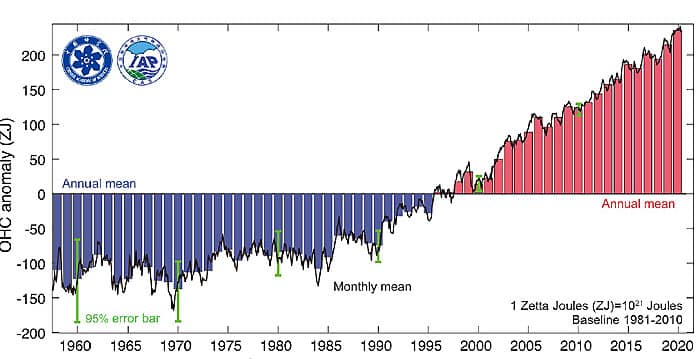
Heat content change in the upper 2000 meters of the global ocean. (Advances in Atmospheric Sciences, January 2021)
Even with the Covid-19-related small dip in global carbon emissions due to limited travel and other activities, the ocean temperatures continued a trend of breaking records in 2020. A new study by 20 scientists from 13 institutes around the world, reported the highest ocean temperatures since 1955 from surface level to a depth of 2,000 meters.
The study was published in Advances in Atmospheric Sciences on January 13. It concluded with a plea to the policymakers and others to consider the lasting damage warmer oceans that can be caused as they attempt to mitigate the effects of climate change.
“Over 90% of the excess heat due to global warming is absorbed by the oceans, so ocean warming is a direct indicator of global warming — the warming we have measured paints a picture of long-term global warming,” said Dr. Cheng Lijing, lead author of the study and associate professor with the International Center for Climate and Environmental Sciences at the Institute of Atmospheric Physics (IAP) of the Chinese Academy of Sciences (CAS).
“However, due to the ocean’s delayed response to global warming, the trends of ocean change will persist at least for several decades, so societies need to adapt to the now unavoidable consequences of our unabated warming. But there is still time to take action and reduce our emissions of greenhouse gases.”
Using a method developed by IAP, the researchers calculated the ocean temperatures and salinity of the oceans down to 2,000 meters with data taking from all available observations from various measurement devices from the World Ocean Database. They found that in 2020 the upper 2,000 meters of the world’s oceans absorbed 20 more Zettajoules than in 2019. By comparison, all human activities use about one-half of a zettajoule each year.
“Why is the ocean not boiling? Because the ocean is vast. We can imagine how much energy the ocean can absorb and contain, and, when it’s released slowly, how big the impact is.”
The researchers reported other effects, such as ocean salinity pattern amplification and more stratification due to the upper layer warming quicker than the deeper sections. Both changes could cause harm to ocean ecosystems.
“The fresh gets fresher; the salty gets saltier. The ocean takes a large amount of global warming heat, buffering global warming. However, the associated ocean changes also pose a severe risk to human and nature systems.”
Cheng noted the 2020 wildfires that ravaged Australia, parts of the Amazon region, and the west coast of the United States.
“Warmer oceans and a warmer atmosphere also promote more intense rainfalls in all storms, especially hurricanes, increasing the risk of flooding. Extreme fires like those witnessed in 2020 will become even more common in the future. Warmer oceans also make storms more powerful, particularly typhoons and hurricanes.”
The researchers will continue to monitor the ocean temperatures and the impacts of warming on other oceanic characteristics, such as salinity and stratification.
“As more countries pledge to achieve ‘carbon neutrality’ or ‘zero carbon’ in the coming decades, special attention should be paid to the ocean. Any activities or agreements to address global warming must be coupled with the understanding that the ocean has already absorbed an immense amount of heat and will continue to absorb excess energy in the Earth’s system until atmospheric carbon levels are significantly lowered.”
Adapted from a news release published January 13, 2021 by the Chinese Academy of Sciences.


